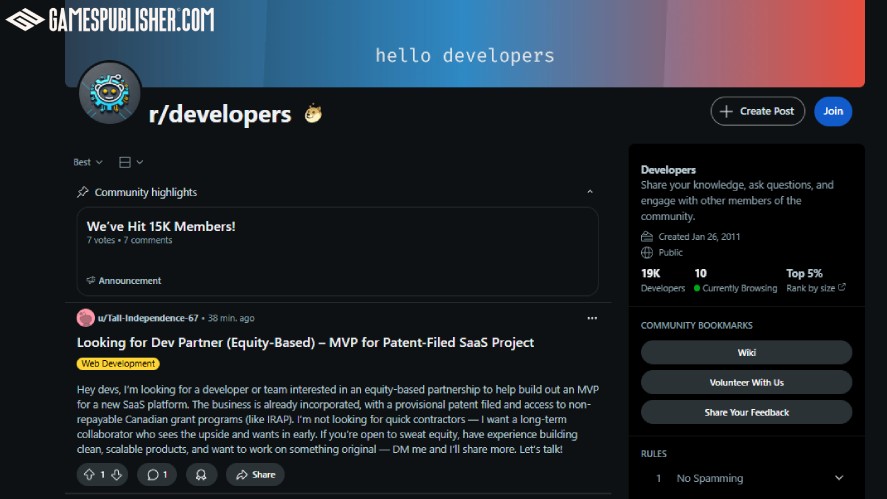Welcome to Gamespublisher.com, your go-to spot for game development and game publishing insights! Whether you’re dreaming of coding the next GTA or running a studio, understanding the average game developer salary is a game-changer.
For aspiring game developers, it’s a roadmap to plan your game programming career. For veterans, it’s a benchmark to negotiate raises. And for video game publishers, it’s key to budgeting projects and snagging top talent.
The video game industry growth drives fierce competition for skilled coders, making salary data a must-know for anyone in game design or jobs in the gaming industry.
Let’s dive into what game developers earn and why it matters!
Average Game Developer Salary Overview
The game developer salary in 2026 reflects the video game industry growth, with pay varying by region, skills, and experience.
Whether you’re curious about how much do game developers make or eyeing a game programmer job description, here’s the lowdown on global trends and career progression.
What is The Average Game Developer Salary in 2026?
Globally, the average game developer salary in 2026 hovers around $110,000 annually. Regionally, salaries swing wildly due to the cost of living and game development demand:
- North America: The U.S. leads with an average game developer salary of $108,471, with Canada close at $100,000-$109,905 for Unreal Engine roles.
- Europe: Western Europe (e.g., Germany, $93,300; France, $83,950) outpaces Eastern Europe (e.g., Ukraine, $50,950; Romania, $49,300).
- Asia-Pacific: Japan ($86,700) and Singapore ($104,300) top the region, while Vietnam lags at $31,700.
These trends show that video game developer salary reflects game development demand and local economies.
How Experience Level Affects the Average Game Developer Salary
Your game developer salary climbs with experience, as game programming career skills in game design and coding deepen.
Here’s how pay breaks down by level:
- Entry-Level (0-2 years): Junior game developers earn $9,600-$79,200 globally, with U.S. salaries at $88,976. Roles involve basic coding (C#, Unity) and bug fixing.
- Mid-Level (3-6 years): Mid-tier game developers make $67,000-$114,000 globally, with U.S. averages at $108,471. They lead small teams and handle complex systems like AI or physics.
- Senior-Level (7+ years): Senior game developers pull $86,000-$156,000 globally, with U.S. salaries hitting $94,000-$172,000. They oversee projects or specialize (e.g., VR/AR).
Salary progression is steep, as U.S. seniors earn 65% more than juniors. Game design courses in Unreal or mobile gaming can fast-track raises, especially in jobs in the gaming industry.
The video game developer salary gap reflects expertise and leadership, making experience a key driver.
Average Game Developer Salary by Region
The game developer salary varies by region, shaped by video game industry growth and local costs.
Whether you’re coding in Silicon Valley or freelancing in Seoul, here’s how much do game developers make in 2026.
United States
Below are the salaries of some states in the U.S.:
- California: $135,000 ($160,667 in San Francisco)
- New Jersey: $136,000
- New York: $136,000
- Washington: $135,760
- Missouri: $130,000
- Massachusetts: $124,000
- Utah: $122,714
Top companies like Roblox and Microsoft pay premiums. High costs in California balance the video game developer salary, but the game programming career demand keeps pay robust.
Europe
Europe’s game developer salary ranges from Western wealth to Eastern value:
- Highest: Germany ($85,500), France ($83,950), Norway ($96,600).
- Lowest: Ukraine ($46,080), Romania ($49,300), Italy ($34,362).
- UK: $28,000-$35,000, with London’s high living costs offsetting pay.
Western Europe’s billion-dollar market fuels demand, but Eastern Europe’s cost-quality ratio attracts outsourcing.
Asia-Pacific
Asia-Pacific’s game developer salary reflects diverse economies:
- Japan: $86,700, high for indies, driven by video game industry growth.
- Singapore: $104,300, tops the region.
- South Korea: $40,590, strong in mobile gaming.
- China: $68,550, per industry estimates, with state-backed studios.
- India: $7,000, cost-effective but growing.
- Southeast Asia: ~$37,600 (e.g., Philippines, Malaysia).
Asia’s tech-savvy market, led by Web3 games like Axie Infinity, pushes game development demand. How much do indie game developers make varies, with Singapore’s pay rivaling Europe.
Remote and Freelance Roles
Remote work and freelancing reshape the game developer salary in 2026, offering flexibility but variable pay.
- Remote game developers earn $86,750 on average.
- Freelance rates range from $15-25/hr in Asia to $52/hr in the US, with seniors charging 2- 3x more for AI/ML or VR skills.
Platforms like Upwork and Fiverr see a decent job growth, letting game developers work for high-pay regions while living affordably.
However, freelancing lacks benefits like health insurance. Remote jobs in the gaming industry offer a work-life balance, but they also come with the risk of unstable gigs.
Average Game Developer Salary by Role
The game developer salary varies wildly depending on the role in game development.
Here’s a breakdown of what game developers earn in 2026, based on their roles.
Game Programmers
Game programmers are the tech backbone of game development, writing the code that makes games run. Their salary reflects their expertise in game programming career skills like C++, C#, and game engines.
- The average game developer salary for programmers in the U.S. is $116,000, ranging from $79,799 (entry-level) to $150,000+ (senior).
- Globally, salaries range from $67,000 (mid-level, general) to $172,000 (senior). Top firms like Electronic Arts pay up to $132,707.
- Proficiency in C++ (used for AAA titles), C#, and Python is crucial. Expertise in Unreal Engine or Unity boosts pay by 10-20%, with Unreal Engine developers earning $147,000 .
Programmers with niche skills like cross-platform optimization or VR can expect top-tier salary for game developer offers, especially at video game publishers like EA or Ubisoft.
Game Designers
Game designers craft the vision, from gameplay mechanics to story. Their salary depends on sub-roles like level designers, narrative designers, and UI/UX specialists, each shaping game genres.
- The U.S. average game developer salary for designers is $149,118, with ranges from $50,772 (junior) to $121,628 (master’s degree holders). Globally, game designers earn $78,852-$103,165.
- Level Designers: Average $57,234, ranging from $56,000 (entry) to $98,000 (senior). They design game challenges, like platformer layouts.
- Narrative Designers: Earn $70,000-$123,000, crafting stories and dialogue, vital for RPGs like The Witcher.
- UI/UX Specialists: Pull $53,500-$172,000, focusing on user interfaces and player experience, critical for mobile games.
Artists and Animators
Game artists and animators bring visuals to life, from characters to environments. Their game developer salary varies by specialization and experience.
- U.S. average game developer salary for artists is $123,136, ranging from $37,000 (entry) to $196,000 (senior).
- 2D/3D Artists: Average $99,000, with 3D artists (e.g., Maya, 3ds Max) hitting $109,000 in large studios.
- VFX Artists: Earn $42,000-$152,000, creating effects like explosions.
- Character Modelers: Pull $46,000-$159,000, designing characters for games.
Audio Engineers and Composers
Audio engineers and composers craft soundscapes, from epic scores to sound effects. Their specialized game development roles often mean unique pay dynamics.
- U.S. average game developer salary for audio engineers is $149,118, ranging from $47,000 (entry) to $156,000 (senior).
- Composers earn $11,000-$61,000, often working as freelancers.
Audio engineers and composers enhance game genres immersion, and their salary reflects specialized skills and project scope.
Factors Influencing the Average Game Developer Salary
The game developer salary isn’t just about coding or drawing; it’s shaped by multiple factors that affect how much do game developers make.
From education to company size, here’s what drives pay in jobs in the gaming industry.
- Education: A bachelor’s in computer science or game design boosts pay, with U.S. designers earning $103,165 (bachelor’s) vs. $121,628 (master’s).
- Certifications in Unity or Unreal Engine add 10-15% to salaries. However, self-taught developers with strong portfolios can compete.
- Portfolio Strength: A killer portfolio with playable demos or polished art is critical. Developers with game design courses showcasing VR or AI projects can negotiate higher pay.
- Company Size: AAA studios (e.g., EA, Ubisoft) pay more than indie studios, with U.S. senior salaries exceeding $115,298 compared to those at startups.
- Project Scale (Indie vs. AAA): AAA projects pay more due to budgets, while indie game developers make averages $108,471 in the U.S.. Indies offer creative freedom but less stability.
- Industry Reputation: Developers with a track record at studios like Naughty Dog can demand more. Networking and reputation open doors to high-pay roles.
These factors shape video game developer salary negotiations, with game development skills and reputation driving the biggest jumps.
How to Increase Your Game Developer Salary
Boosting your game developer salary takes more than just time in the field; it requires strategy.
Here are proven ways to level up your earnings:
1. Advance Your Skills
Employers reward game developers who push beyond the basics. If you’re only comfortable with Unity’s Inspector or Unreal’s default templates, it’s time to go deeper.
Mastering complex engine systems, like Unity’s DOTS or Unreal’s Niagara VFX, signals you’re ready for higher-level challenges (and pay).

Beyond engines, advanced scripting in C++ or C# and understanding multithreading, rendering pipelines, or memory management can quickly set you apart. The more bottlenecks you can fix and systems you can optimize, the more indispensable you become.
Also, learn the tools that studios rely on daily: Git for version control, Jira for tracking, and performance profilers. These skills make collaboration smoother, and your resume stronger.
2. Get Certified
While degrees and certificates aren’t everything, they’re still useful for backing up your expertise, especially if you’re self-taught or switching from another tech discipline.
Certifications from Unity or Epic Games give hiring managers a fast way to verify your skills.
But proof doesn’t have to come from paperwork. Shipping your own game, contributing to an open-source project, or even building tools for other developers can showcase your knowledge just as effectively.
The key is visibility. If you can’t prove you can do the job, someone else will.
3. Specialize in High-Demand Areas
Not all game developers earn the same, even with the same experience. Why? Because some skill sets are simply harder to find.
Multiplayer network engineers, technical artists, tools programmers, and specialists in live-service systems are examples of roles that combine technical depth with niche value.

These areas tend to command higher salaries, especially in mid-to-large studios.
If you’re not sure where to focus, look at current job boards. Notice which specialties get posted often or have fewer applicants. That’s your opportunity!
4. Build a Strong Portfolio
A polished portfolio can open doors that a resume alone won’t. But don’t just list projects—curate them.
Instead of uploading everything you’ve made, select 2–3 strong pieces that represent your best work.
Break them down: what problem did you solve, what did you build, how did it impact the game or team? Add visuals or even short videos showing features in action.
The goal is to demonstrate your thinking and contribution, not just show off flashy graphics or a finished game.
5. Network and Collaborate
You don’t need to be a LinkedIn influencer, but you do need to make yourself visible.
A surprising number of jobs come from mutual contacts, former teammates, or chance encounters at game jams. So, join developer forums, local meetups, Discord servers, or subreddit communities when possible.

Give feedback on someone’s project, share progress on your own, ask questions, and answer some too.
Over time, this builds trust. And trust often turns into opportunity.
6. Know Your Worth and Negotiate
Game devs often skip the most important step: negotiation. Don’t.
When you receive an offer, always do your homework. Check salary benchmarks on Levels.fyi, Glassdoor, or even Reddit threads. Compare based on location, role, and experience. Then use that data to confidently negotiate.
If you’re already employed, don’t wait until you’re burned out to discuss a raise. Track your wins, like bug fixes, performance boosts, feature rollouts, and bring them to your manager during reviews or salary talks.
Asking for more doesn’t make you greedy. It makes you professional.
Salary Comparisons with Other Tech Jobs
Wondering how your game developer salary stacks up? Here’s a quick comparison.
| Role | Average Salary |
|---|---|
| Game Developer | $108,471 |
| Software Engineer | $123,573 |
| Mobile App Developer | $117,741 |
| Web Developer | $82,977 |
| Data Scientist | $127,618 |
While game devs may earn slightly less than traditional software engineers, many accept the tradeoff for creative freedom, industry passion, and project variety.
However, developers in senior, lead, or specialized technical roles in gaming can easily out-earn generalists in other fields.
Top Companies Hiring Game Developers
Here are some of the top employers in the gaming world, and what you can expect to earn there.
| Company | Average Salary Range | Notes |
|---|---|---|
| Epic Games | $208,000 | High pay, Unreal Engine expertise valued |
| Riot Games | $141,941 | Known for competitive compensation & benefits |
| Ubisoft | $127,839 | Global presence, pay varies by region |
| Nintendo | $98,802 | Competitive pay, often Japan-based |
| Activision Blizzard | $84,229 | Well-paying with big IPs and studio resources |
| Electronic Arts (EA) | $74,318 | Great for sports and mobile game devs |
Company prestige and location also impact pay. Studios in California or Washington often pay more due to the cost of living, while remote roles may offer flexibility and competitive global rates.
Tools and Platforms to Research Game Developer Salaries
Want to stay informed? These platforms help you explore real salary data.
- Glassdoor: Great for anonymous salary reviews and company culture insights.
- Levels.fyi: Best for understanding salary bands at tech companies, especially for software/game dev crossover roles.
- Payscale: Custom salary calculators based on experience, skills, and location.
- Game Developer (formerly Gamasutra): Offers annual game industry salary surveys.
- LinkedIn Salary Insights: Useful if you’re applying to a specific region or company.
Bookmark these for negotiating offers or planning career transitions.
Conclusion
Whether you’re just breaking into game development or looking to level up your career, understanding salary trends is essential. From honing high-demand skills to targeting top-paying employers, your choices shape your future earnings.
Keep researching, keep learning, and don’t settle for less than you’re worth. For more deep dives into industry insights, hiring tips, and game development career guides, explore the rest of Gamespublisher.com.
Loading survey...

